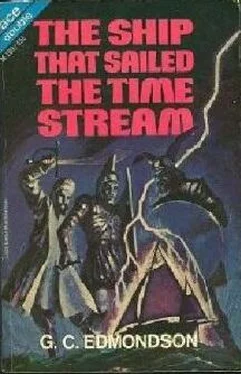The rifle cracked and another legionary fell off the bridge. Joe began firing again. Roman discipline was beyond belief. The pistol was empty again. He swung it, trying to knock the sword out of the hand which darted from behind that shield. The shield edge came up smartly under his chin—and that was the end of the fight for Joe.
Up till now he hadn’t really believed. He had plodded blithely along with some blind, Pollyanna-like faith that everything would turn out all right. The Moors had been a lackadaisical lot compared with these Romans.
He studied them covertly through his eyelashes, pretending he was still unconscious. They had hard, curveless faces—all slabs and angles—with the humorless look of pure fanaticism.
Someone kicked him. He struggled to his feet and immediately a brass-knuckled fist knocked him down again. Romans passed like ants in an endless stream down the after scuttle and up the forward, inspecting and looting.
This is it, Joe thought. These slab and angle faced Romans would not be so easily bamboozled as Vikings and Moors. A hobnailed boot rolled him over again.
“Qui’ e’ ma’ister?” the boot’s owner asked. The scholarly corner of Joe’s mind noted that even this early the Roman lower classes were dropping their s’s and g’s.
“Ego sum,” he answered.
“Not are—were,” the Roman corrected. He led Joe across the korax and Joe glanced briefly at the island.
How could it lie there, primitive and peaceful, when his own world had just come crashing to an end? And where, he wondered briefly, was the caique? But the Roman was whacking him across the buttocks with the flat of his sword. Joe stumbled off the end of the korax, onto the catwalk, and made his way aft to the poopdeck.
There, enjoying the bright morning sunlight, sat a man in a folding chair, behind a folding desk, on which lay a great many unfolded papers. The breeze kept fluttering the papers and he had them weighted down with sword, dagger, his gold collar, and his brass knuckles. With his left hand he slid pebbles in the slots of an abacus-like gadget of terra cotta while scribbling sums on a wax tablet with his right. From the look on his face, things weren’t adding up. “Now what?” he growled.
The marine explained.
“Speak Latin?” the man behind the desk asked.
“A little.”
“Where from?”
“America.”
“Where’s that?”
“About 4000 Roman miles west of the Pillars of Hercules.”
“I’ll bet,” the Roman grunted. “What’s your name?”
“Josephus Rate.”
“You don’t look like a Jew.”
“I’m not. I’m an American. If it’ll clarify things, my great grandfather was born in Brittania.”
The Roman fixed one unblinking barracuda eye on him.
“Others of my line came from Germania and Hibernia.”
“Quite a mongrel, aren’t you?”
“You Romans aren’t exactly pure any more.” From the other’s pained look Joe knew he had struck a nerve.
The Roman gave him a long, hard stare, then barked an order. Joe found himself propelled back amidships.
The oarmaster put him at one of the starboard top bank oars. At last he was getting firsthand knowledge of the question which plagued every scholar a century fore and aft of Mahan. His limp right hand was thrust into a manacle. An armorer riveted it shut, missing once with the hammer and skinning Joe’s knuckle. The cuff fastened with a foot of chain to the heavy five-manned oar. Joe was outboard, facing forward next to the oar-lock. Who said the Romans never invented anything, he wondered?
Greek and Phoenician penteconters needed skilled oarsmen—and a man couldn’t learn to row in a day.
With three men on each lower oar and five on each upper, this quinquereme required only one oarsman to each. The other two or four faced each other and followed his stroke. The stroke man was not chained.
Joe wondered if he was a trusted slave or working for wages.
They were an odd lot, ranging from a bluegum Nubian to several blond Scandinvavian giants. Joe tried to guess the language. Here a Latin word cropped up, there a phrase in Greek koine. It was beyond Joe. An artificial language, he guessed, like Legion French, the sort of bastard dialect which develops whenever strangers are thrown together.
He had finally succeeded in thoroughly and irremediably botching things up. And, he reflected, it was all his own fault. Why couldn’t he have gotten out of here last night? Under jib and jigger the Alice would have been twenty miles away by now and with daylight he could have set the main.
Too tired! This was what happened to captains who could afford to get tired. He took a deep breath and tried to drive the mind sapping despair out of his body. What was he going to do? Mutiny?
That, he suspected, he would not do. He climbed on the narrow bench, standing as straight as the chain would permit. The imam was five oars ahead of him.
Gorson was chained to an oar on the portside. The rest of the Alice’s men were scattered throughout the lower bank.
What had happened to Ma Trimble and her girls?
They would switch allegiance at a moment’s notice anyway—why worry? He wondered how he would stand up under the strain of rowing. How would he take the oarmaster’s lash?
He looked aft again. Gorson was sunk in apathy, his head resting on his oar. Raquel forced her way to the top of his unwilling mind. Ma Trimble’s blondes were of this era and capable of looking after themselves.
But Raquel— From where he sat amidships no female was visible. He squinted through the thole hole down at the Alice.
Roman nautae were fumbling helplessly with her running rigging. They had the jigger raised after a fashion, though its luff puckered and bagged like Maggie’s drawers. Great snarls and Irish pennants festooned the mainmast. They had not fathomed the mysteries of the winch ratchet, nor had they managed to raise jib or mains’l.
Someone shouted and they cast off the Alice’s stem line. A moment later they bunched in the bow and, ignoring the electric windlass, began hauling the Alice hand over hand toward the pinnacle which moored her bow. Not understanding the why of the chain locker’s deck eye, they piled line in a great tangled heap atop the winch.
An expectant rustle ran through the oar benches. Better pay close attention, Joe decided. There was a double blat-snort from an offkey trombone. The anchor man on each oar began unlashing the oar behind him. Joe hurried with the lashings but he was too late.
CRACK! The noise numbed his eardrums like a pistol in a small room. He felt his shirt rip between his shoulder blades. That mad corner of his mind admired the skill of an oarmaster who could create such a devastating effect without harming his animals. He was still fumbling with the strange knots when the CRACK came again. It ploughed an inch-long furrow across the point of his shoulder blade.
He finally slipped the lashing. There was another flat blat and he stumbled hastily backward to avoid being crushed between his own oar and the bench. Someone began pounding a drum. After a couple of strokes Joe began to get the feel of the rise, one step forward, fall back on the bench.
The oar was clumsy as a telegraph pole. Most of its power came from inboard where the unchained oarsmen guided the stroke, walking three steps fore and aft.
He barked a single unintelligible word at Joe. On the next stroke Joe pushed harder.
Another discordant blat. They stopped, backing water with one reverse stroke. Joe pushed the wrong way, working against the four men.
CRACK! This time the lash bit deeper.
They rested, awaiting the next signal, and Joe glanced covertly at the man who held the whip, studying the graying, shaggy haircut, the jutting chin with its week-old growth of black beard, engraving this face in his memory. What had become of his detached historian’s viewpoint? That ignorant clod was merely doing his job. Joe shrugged. The welts began to throb. His scholarly detachment departed, along with several of his boyish illusions.
Читать дальше











